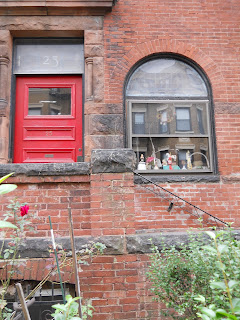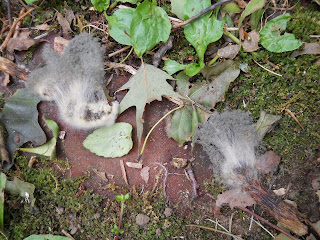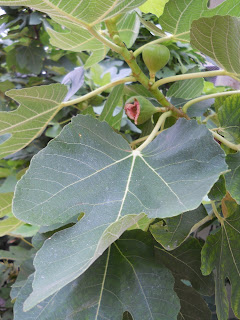Never talk to strangers we're told. If, while you're out, on foot, and a stranger stops his or her "vehicle" and asks you to come closer, don't! I'm, of course, no longer a child, though child-size. In northern New England, where I visited last week, I went out on the unexpectedly warm morning the day before Easter and walked down a dirt road, mountains in the distance, water rushing in the ditches. Small daisy-like yellow wildflowers--not sure what they were--had opened: all flower, no leaf. (Camera broken so no photo.) Happily I poked along--literally: I had picked up a walking stick. Down the steep dirt road I went and, when the road petered out, turned back, making my way to the paved road.
Though there wasn't much traffic I walked facing oncoming cars and made sure my long red scarf was visible. On the side of the road I picked up a discarded pale purple shopping bag in good condition. I'll use this, I thought, stick in one hand, empty holiday bag in the other. A voice called, 'Isn't it a beautiful morning!' Startled I looked to my right and saw a woman who had stopped her SUV in the middle of the road. Her large, round, bright face came at me from the driver-side window. A girl, most likely her daughter, sat in the passenger's seat, her head down.
'Yes,' I answered. 'Beautiful.'
'Are you going to church?' she asked.
'No,' I said in a perfectly even voice.
'I have something for you,' she said. Her smile was sunny and intense.
Curious, I went closer. She held out a pen and a card encased in plastic. Her serious daughter never looked up. The driver's eyes lit up: big, round, blue. I took the pen.
The woman waved and drove off. I held the pen and read the message in shades of blue. "Welcome Friend!" Welcome printed five times in differently sized fonts. At the bottom of the card: "We're blessed because you're here." On the reverse side were verses from the New Testament, mostly from the Book of John, and sayings: "God loves you!" followed by "We all feel the terrible effects of sin in our lives." I looked at the lovely pale blue mountains in the distance. A woodpecker tapped, tapped again. Wandering again I walked on, the violet bag on my arm.
The blue pen on the kitchen counter in South Beach where I'm typing is still sealed in plastic. Through the plastic I can make out the fine print circling the bottom of the pen: John 14:6. The verse appears in full on the card: "Jesus told him, 'I am the way, the truth, and the life. No one can come to the Father except through me.'" I don't break the seal.



















































